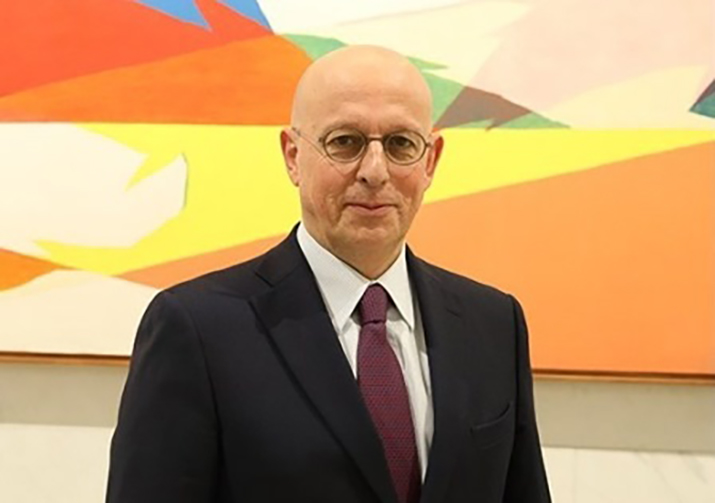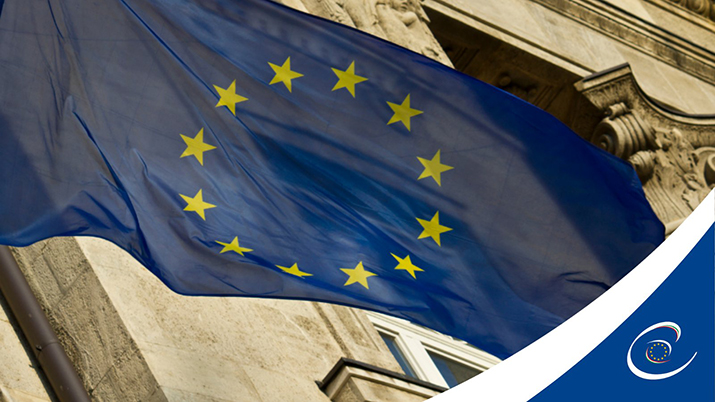HAPPENING AT THE COUNCIL OF EUROPE
INTERVIEW WITH AMBASSADOR MICHELE GIACOMELLI
Multilateralism is a sort of fingerprint of Italy starting from after the Second World War. The active presence in the institutions in which ideas meet, grow and find a way for shared action has been one of the characteristics of Rome's political and diplomatic activity for decades. It is a complex path, difficult at times, during which we have to keep certain key principles fixed, repeat them and patiently carry them on, knowing that although we ourselves may not reap the fruits of this resolve, somebody in the future will do so. Meeting Michele Giacomelli, permanent representative to the Council of Europe, halfway through Italy's six-month presidency, it is interesting to find out how this path has developed in Strasbourg, and to get an idea of possible future developments.
"Italy", he says "has held the Presidency of the Committee of Ministers seven times before this one, which is the eighth, 21 years after the previous one in 2000. With the current membership this periodic appointment will be repeated only after another 23 years. It should also be said that, until the1980s, the role of the Presidencies of the Committee of Ministers was essentially bureaucratic. It was only from the 1990s onwards that they began to express their priorities in the activities on the Committee of Ministers and therefore to have a role as a driving force in the overall life of the organisation. Among the Italian Presidencies of the past we find outstanding politicians in the history of Italy, such as Carlo Sforza (1950), Gaetano Martino (1955), Aldo Moro (1969), Arnaldo Forlani (1977), Giulio Andreotti (1986) or Lamberto Dini (2000). Under the Italian Presidency of 2000 the membership was widened to include Armenia and Azerbaijan, parties to an exhausting conflict that is still going on today. Under the current Presidency, the process of reforming the system of the European Social Charter, first activated in 1961 in Turin, has been set in motion".
The principles underlying the construction of the “common European home” are more present than ever and we cannot take them for granted
During the first half of the current Presidency, Italy has organised numerous initiatives and dictated the agenda of the Council of Europe- What have been the main results achieved?
Among the most significant events created up to now, I would like to mention the visit to Strasbourg of the Equal Opportunities Minister Elena Bonetti and the meeting in Venice between Justice Ministers of the Council of Europe countries. The former took place on 25th November, the International Day for the Elimination of Violence against Women, in which Minister Bonetti reminded us of the importance of the Istanbul Convention on the tenth anniversary since its signing and took part in the High Level Segment of the Gender Equality Commission (GEC) of the Council of Europe. The latter took place on 14th and 15th December in Venice, under the Presidency of Minister Marta Cartabia and a significant presence of various ministers; this led to the approval of a declaration on reparative justice, a new form of criminal justice which enables a dialogue and cooperation between the perpetrator of the crime and the victim, and acts as a form of complementary justice to the traditional punitive model. Finally, I should mention the approval by consensus, in November, of the Organisation's two-year budget and four-year programme, achieved through negotiations that were not always easy between the various sensitivities present in the membership.
What are the next initiatives from which you expect the most?
In the second half of our Presidency we have events of equal importance. I would like to mention three of them. Firstly, the meeting of Culture Ministers, planned for 1st April in Strasbourg, which will be dedicated to the theme of culture as a strategic resource for a more sustainable, pluralist Europe. The second is the high-level meeting on Friendly Artificial Intelligence, to take place in Rome on 4th and 5th April, where politicians and experts will discuss how to make these modern tools compatible with human rights, the rule of law and democracy through, among other things, setting up negotiations for a framework instrument, legally binding, to regulate the entire subject. The third event is the launch of the new Council of Europe strategy for the Rights of the Child, expected to take place in Rome on 7th and 8th April in the presence of Luigi Di Maio, Minister for Foreign Affairs and International Cooperation, Marija Pejčinović Burić, Secretary General, and Tiny Kox, President of the Parliamentary Assembly of the Council of Europe.
The Italian Presidency concludes in May, but Italy's diplomatic initiatives will obviously continue beyond that date. What is, or might be, the role of Rome in the Strasbourg Assembly?
Italy's role in the Council of Europe is, and will continue to be, on the front line. Remember that Italy was one of the founder-member countries and is one of the largest contributors in the Organisation. Ever since its constitution, Italy has always been inspired by the values and principles on which the Statute of the Council of Europe and the construction of the "common European home" are based - values that are now more current than ever, that we cannot take for granted, and that should be repeated through the tool of multilateralism, in which we continue firmly to believe. In this context Italy will continue, even when its Presidency is over, to work so that its priorities remain high on the Organisation's agenda and will continue to be developed in the actions of future Presidencies following ours.

Ambassador Michele Giacomelli, permanent representative of Italy to the Council of Europe







